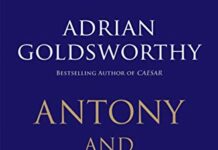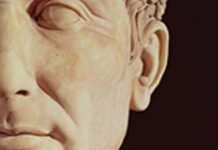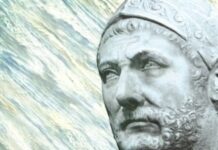
Ebook Info
- Published: 2014
- Number of pages: 625 pages
- Format: PDF
- File Size: 5.83 MB
- Authors: Adrian Keith Goldsworthy
Description
The acclaimed historian and author of Caesar presents “a first-rate popular biography” of Rome’s first emperor, written “with a storyteller’s brio” (Washington Post).The story of Augustus’ life is filled with drama and contradiction, risky gambles and unexpected success. He began as a teenage warlord whose only claim to power was as the grand-nephew and heir of the murdered Julius Caesar. Mark Antony dubbed him “a boy who owes everything to a name,” but he soon outmaneuvered a host of more experienced politicians to become the last man standing in 30 BC. Over the next half century, Augustus created a new system of government—the Principate or rule of an emperor—which brought peace and stability to the vast Roman Empire. In this highly anticipated biography, Goldsworthy puts his deep knowledge of ancient sources to full use, recounting the events of Augustus’ long life in greater detail than ever before. Goldsworthy pins down the man behind the myths: a consummate manipulator, propagandist, and showman, both generous and ruthless. Under Augustus’ rule the empire prospered, yet his success was constantly under threat and his life was intensely unpredictable.
User’s Reviews
Reviews from Amazon users which were colected at the time this book was published on the website:
⭐Very satisfied with this book. I learned a lot about Augustus that I did not previously know. I learned about a lot of important people and events during the Pax Augusta that I never heard of before. Goldsworthy does a great job of cutting through the thick propaganda of the original sources and painting a picture of a flawed opportunist that was incredibly lucky and bold in his achievements. Augustus’ was also sad and full of sickness and death. These are important threads of Augustus that many other biographers and historians cut out. Goldworthy tells the story with all the ups and downs, triumphs and blunders, blessings and curses of Augustus’ life.
⭐In his biography of Julius Caesar
⭐, the image of the great man emerges almost immediately. Not so in this account of Augustus. Instead the features of Augustus emerge gradually as if one were watching a photo in a bath of developing solution. And the first faint images of Augustus are not very flattering.The young Augustus seems cold, indifferent to the point of cruelty, and monstrously calculating. Of course, he had to be all of those things and more. At nineteen he was thrust into the blood-drenched world of Roman politics and was probably the least likely person to emerge on top. Yet, he somehow did reach the pinnacle and from there, and in the latter half of Goldsworthy’s biography, he emerges in full view as a truly great and decent man and probably one of the most accomplished leaders in history.Unlike his great-uncle, Julius Caesar, Augustus was not a great general. That he left to such men as Agrippa, who was a general and a great deal more. Almost our first understanding of the quality of Augustus comes from the fact that he could attract the love and loyalty of a man like Agrippa. Though a great general, Agrippa was not fond of war. Indeed, Goldsworthy quotes him as saying, “If peace makes small things grow, discord will tear down great things.’ p. 353. Augustus and Agrippa built great things, roads and magnificent buildings, but because of them the Empire flourished with the growth of many of the fine, small things that are the true ornaments of civilization.I was particularly struck by the problems that Augustus faced building his great Forum Augustum in the Roman Forum. Construction was delayed because nearby property owners refused to sell their interest. Ultimately, although much of the needed property was acquired, one or two obstinate property owners held out to the end and Augustus was compelled to build his great structure with an irregular shape in the northeastern corner. Goldsworthy says, “Perhaps it was frustrating for Augustus, but his willingness to accept this showed his respect for the rights of property and an unwillingness to override them even for the wider good of the state, let alone his own fame. In some ways this very imperfection of the new Forum was a more valuable symbol than perfect symmetry would have been.” p. 403.One may contrast the restraint of Augustus with the situation in the present United States where the Supreme Court’s infamous KELO decision grants state powers not only to seize private property for the use of the public but also for resale to another, more attractive, private party.Augustus in later life saw himself as a sentry guarding the Roman people and he worked very hard to improve their lives. The work was so arduous that his ultimate successor in training, Tiberius, dropped out and fled to Rhodes to listen to lectures and rest rather than grind away every day helping Augustus solve the problems of the empire. Ultimately, when Tiberius became emperor because there was no one else left to take the job, he held the title and fled to another island, Capri, leaving much of the toil to Sejanus with ugly consequences. But Augustus never quit until overtaken by death.The first emperor cherished and encouraged the friendship of the likes of Agrippa, Livy, Vergil, Horace and many others. He boasted that he found Rome a city of bricks and left it a city of marble. On his last voyage down the coast of Italy his ship passed a merchant vessel from Alexandria. When they recognized the emperor’s ship they shouted acclaim and praise, and thanked him for making their lives so good. Augustus seemed to take greater pride in this than the triumphs awarded to him. Many of the triumphs he turned down. He sent gifts to the Alexandrian merchants. Like his friend Agrippa, Augustus wanted to make the world safe for many priceless little things to grow.Goldsworthy has given us a readable, interesting and valuable biography of one of the greatest men in history.
⭐As a longtime Presbyterian minister I have been fascinated with ancient history. Caesar Augustus who reigned from 27 BCE to 14 AD was the first and greatest Roman emperor. It was he who is mentioned in Luke’;s gospel in the nativity story. Dr. Adrian is a renowned British military scholar whose expertise is on the Roman Army. Goldsworthy has written well received biographies on Julius Caesar and Antony and Cleopatra as well as many others. In this long biography he writes with a novelist s skill and a historian s love of research to produce a fine biography of Augustus. He was born Octavian and was a grandnephew of Julius Caesar. Octavian grew up during civil unrest and war. Julius Caesar defeated Pompey at Pharsalus in 48 BC but was slain in the Senate. The leading conspirators against him were Brutus and Cassius. The young Octavian joined forces with Mark Antony to wipe out the assassins at the battle of Philippi in 42 BC. Octavian would then go on to defeat Mark Antony and Cleopatra at the battle of Actium in 31 BC. He was given the name Augustus by vote of the Senate and ran an efficient military dictatorship. His long rule of over forty years led to extensive building in Rome and the establishment of Roman colonies and roads in Gaul, Spain and the eastern empire. He was married to the formidable Livia though he was often unfaithful to her. His reign saw long periods of peace and he passed the empire on to his stepson Tiberius. Goldsworthy has produced an excellent biography of a man who moulded the Roman Empire into the most powerful government in the ancient world Well done! First Rate!@
⭐This is very thorough – yet accessible – biography of Augustus. Goldsworthy gives us a detailed chronological biography, beginning before Augustus birth with an intro to his family and immediate forebears, including of course, Great-uncle Julius. We then move on a very steady pace through his long life to his death an date immediate aftermath. Through Augustus eyes we also learn a great deal about Rome and the Mediterranean world of the times. I liked how Goldsworthy gives the reader background on the sources, the gaps in our knowledge, and competing interpretations of events (with his conclusions and reasons). I sensed that “I Claudius” is silently in the background since a lot of what the layman knows of this era comes from that novel (or the TV series). So he considers, e.g., whether Livia had a hand in the deaths of various rivals to Tiberius.One quibble – that is not at all Goldsworthy’s fault. The author included what I expect would have been helpful genealogy charts since keeping track of the forever marrying, birthing and divorcing Romans can be challenging. Kindle need to figure out a better way to make the types go graphics legible in the ebooks.
⭐Most people have an image of Ancient Rome based more on films/TV than history. Andrian Goldworthy, like any worthy historian, gets to the “warts and all” truth about the man Augustus. From the young ruthless Octavian to the old wise Imperator Caesar he clearly charts the rise to prominence of the (possibly) only benevolent dictator who has ever existed. Fascinating history and legacy. A must read for all lovers of factual Roman History.
⭐Bought as a present and well-received.
⭐he writes brilliantly
⭐excellent well writen
⭐La forma en la que cuenta la vida y obras de Augusto es magnífica, logra unir y explicar al explosivo Triunviro Octavio y afable y Sabio Augusto
⭐
Keywords
Free Download Augustus: First Emperor of Rome in PDF format
Augustus: First Emperor of Rome PDF Free Download
Download Augustus: First Emperor of Rome 2014 PDF Free
Augustus: First Emperor of Rome 2014 PDF Free Download
Download Augustus: First Emperor of Rome PDF
Free Download Ebook Augustus: First Emperor of Rome




